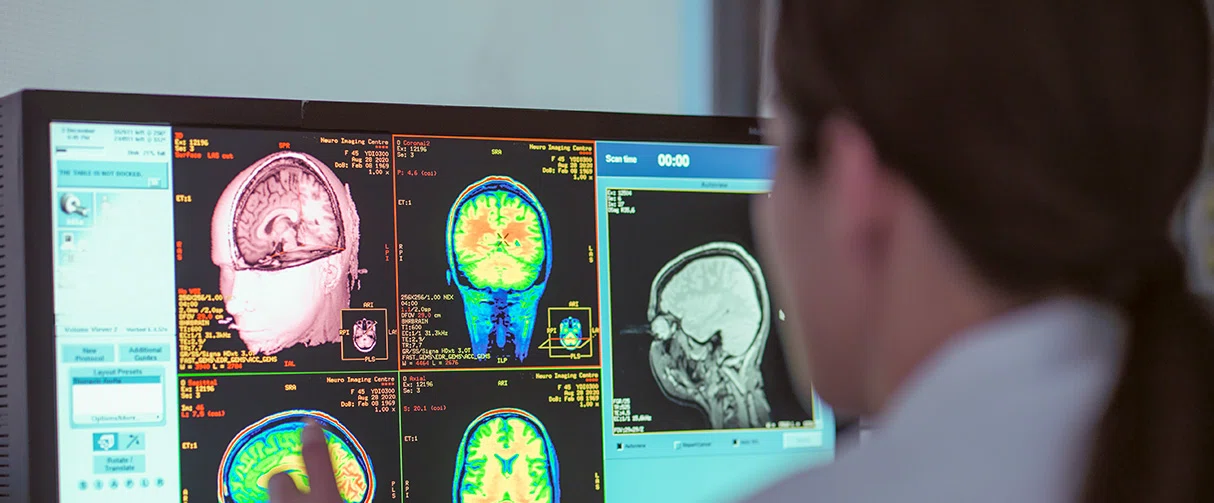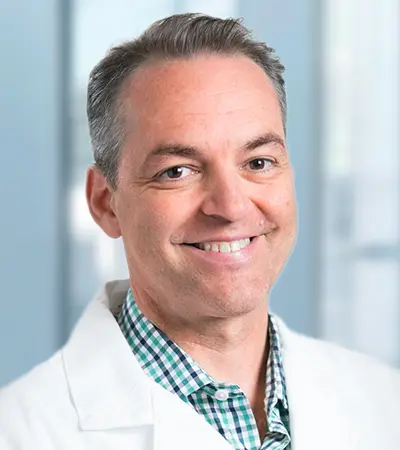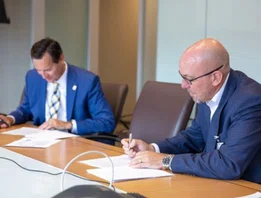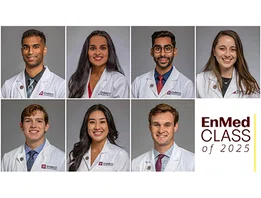


Innovative Education
Access the Nervous System through the New Neuroscience PhD Program
The Neuroscience PhD program, which kicked off in 2022, is led by Philip Horner, PhD, and follows the traditional learning path

Neuroscience encompasses the study of the nervous system and how it controls bodily functions. The nervous system is composed of two main parts: central (brain and spinal cord) and peripheral (all the nerves that extend from the spinal cord to the rest of the body). The nervous system plays a critical role in cognition, learning and memory, motor/sensory function, all the way down to how your brain senses and processes pain. Processes such as homeostasis (regulating body temperature and blood pressure) are also controlled by the brain.

Philip Horner, PhD
In 2022, the Houston Methodist Academic Institute welcomed a new doctoral program in neuroscience that is a collaboration with Weill Cornell Medical School. This program spans basic, translational and clinical research. Joint faculty in the program are conducting internationally recognized research in models of aging, neurodegeneration and injury within cell, animal and human model systems and will challenge students to develop expertise beyond neuroscience, such as organ and brain interactions, systems level physiology, engineering and computational biology.
Graduate research fellows develop diverse areas of expertise, such as developmental neuroscience, or the study of how the nervous system grows and matures. As Philip Horner, PhD, Director of the Weill Cornell PhD Program in Neuroscience, Houston Campus, describes the topic, “Developmental neuroscience studies the building blocks of the brain, the molecules and genes that create it, and there are many sizes and shapes in the brain. It’s miraculous that you start with just a few cells, and you end up with a brain that can become a tennis player or write poetry.”
Horner’s role as director includes facilitating the program, the selection of new students, overseeing their progress, and ensuring they get placed on their professional career path. Importantly, he says, “I want to ensure they’re taking advantage of all the rich training opportunities we have at Methodist.”
The Neuroscience PhD program follows the traditional path of three basic learning components, which are typically completed within four to six years. The first is initial classroom training to allow the student to absorb in-depth knowledge about the nervous system. Students will learn how to read scientific papers, present ideas and become proficient in the “language” of neuroscience. In the second phase, students prepare for a general exam in front of a committee panel of experts to prove their proficiency. The third phase sees the students develop a thesis, execute experiments to test their hypothesis and, finally, defend their thesis. Upon graduation, each student will have become an expert in one area of neuroscience and, perhaps more importantly, will have learned to solve scientific questions and to continue to learn about any other areas in which they are interested.
I want to see our students placed in great careers, through demonstrating an impressive training history here at Methodist and at Weill Cornell. And I envision the program being endorsed by the National Institutes of Health (NIH). In five years, I want to be funding a lot of graduate students through NIH training programs; that would be an important measure of our success.
Philip Horner, PhD
Director of the Weill Cornell PhD Program in Neuroscience
Houston Campus
A neuroscience PhD prepares participants for a wide variety of career choices. Research is a top priority for many but graduates also may find themselves working for or starting a company, teaching in a liberal arts college, or becoming a science editor for a scientific journal. Horner says that the knowledge gained in this program is unique because many careers benefit from an understanding of the brain and human behavior, so neuroscientists are in high demand.
The program came about naturally. The Neuroscience group at Houston Methodist has had a meteoric rise since its inception. Relatively new, the team already comprises multiple faculty and projects a real presence in the community, not just here but nationally. “If you’re going to start a program,” says Horner, “you have to have a critical mass of faculty, be well-funded, demonstrate a good record of training and have faculty who are motivated and inspired to make it work.”
The neuroscience faculty had past relationships with other institutions with PhD programs, such as Rice University and Baylor College of Medicine, and they felt that Houston Methodist was missing an important element that could be both important to Methodist and beneficial. Thus, John Cooke, MD, PhD, and Dirk Sostman, MD, began to formulate a plan to bring the program about. Houston Methodist already had a longstanding arrangement with Weill Cornell Medical School and the two knew that, to convince Weill Cornell of the expediency of creating a neuroscience PhD program, they would have to show that Methodist’s faculty would not only add value to Weill Cornell’s existing organization, but that Methodist’s team was unique and would offer different training opportunities than already existed. Through Dr. Horner’s leadership, Houston Methodist neuroscientists forged relationships with the Weill Cornell neuroscience program faculty to establish areas of research synergy and neuroscience educational activity, especially focused on neural plasticity and regeneration. The plan was successful, and the first group of neuroscience students begin in the summer of 2023.
The inaugural class of the Weill Cornell/Houston Methodist Neuroscience PhD program includes
Isis Yamile Torres Sicairos, Marisela Martinez de Kraatz, Joseph Zambelas and Lorna McMahon.
So what does Dr. Horner foresee for this inaugural program? Two main goals: “I want to see our students placed in great careers, through demonstrating an impressive training history here at Methodist and at Weill Cornell. And I envision the program being endorsed by the National Institutes of Health (NIH). In five years, I want to be funding a lot of graduate students through NIH training programs; that would be an important measure of our success.”
Luanne Jorewicz, August 2023
Related Articles








